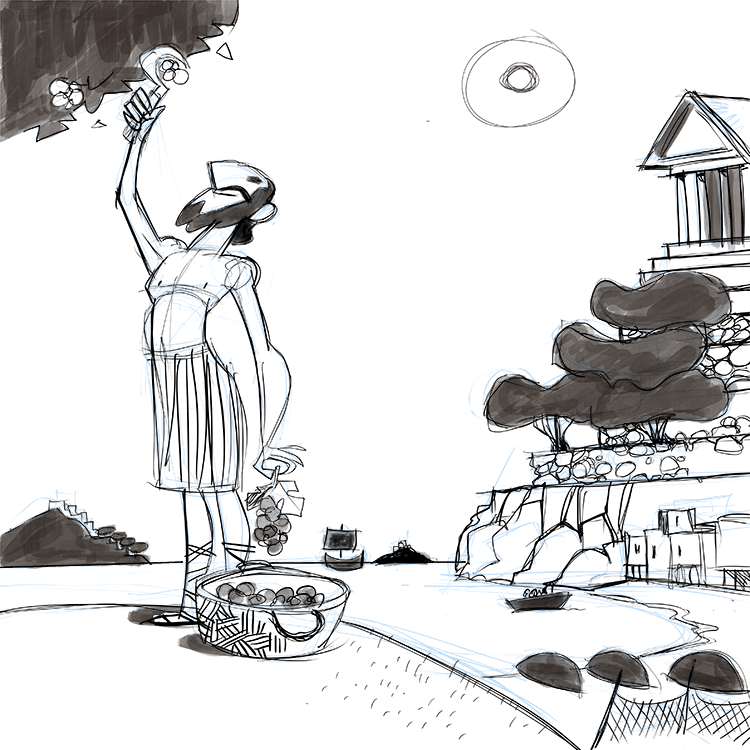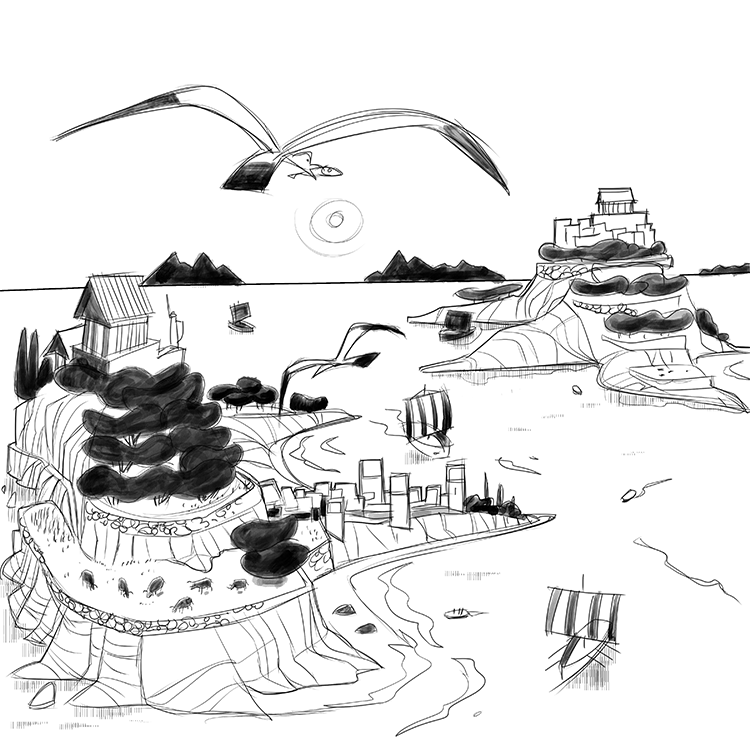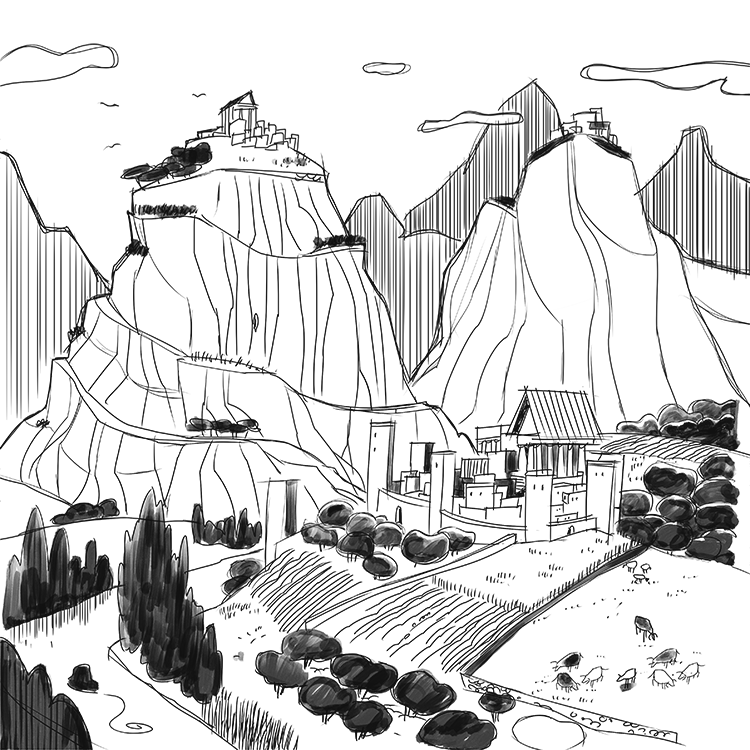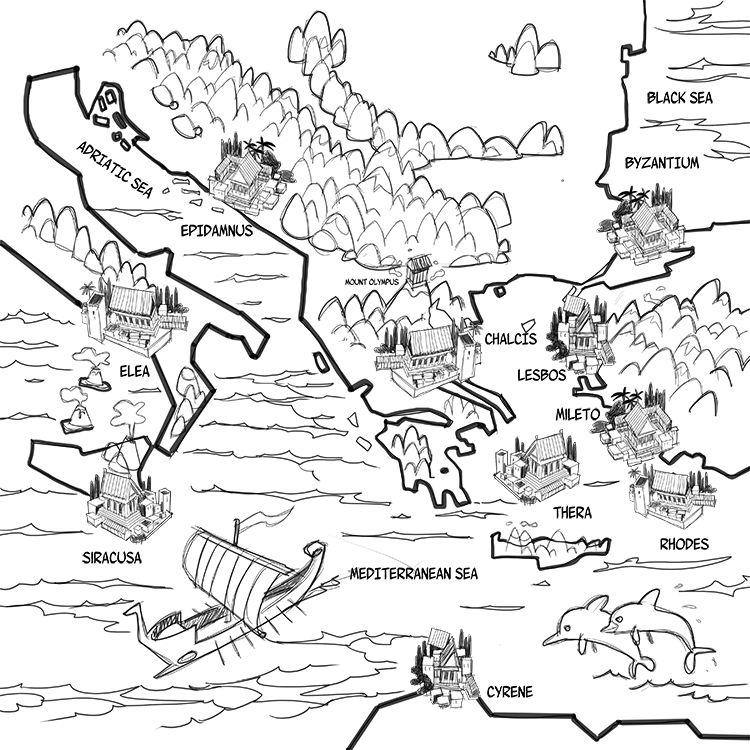So much of human history is determined by what people do. Whether it’s buildings, social institutions, or wars, our actions define our history.
But while human imagination can take people anywhere, we are always bound by the land.
Ancient Greece was one of the most imaginative and inventive cultures of the ancient world. Yet its unique path was made possible in large part because of the geography of ancient Greece.

The Mediterranean Climate
Today, the nations of the Mediterrannean – Greece, Italy, Spain, France, Turkey, etc. – are premier vacation destinations.
Defined by clear, calm waters and gentle coastlines that are warmed by a hot summer sun, people flock to these locations from all over the world.
Back in ancient times, the people living in Greece enjoyed a similar climate. The hot summers and warm winters made for comfortable living conditions and allowed for year-round farming.
But back then, there really wasn’t such a thing as vacation. Life was a bit too hard for people to take a few weeks to hang by the beach.
Instead, the Greeks, like most ancient cultures, spent most of their time farming. In the lowland areas, they mostly grew grains such as wheat and barley.
In other regions with less-fertile soil, the temperatures and dry air were perfect for growing olives and grapes for wine. From these crops, they made olive oil and wine, which were traded all throughout the ancient world.
Early civilizations such as Greece could thrive in these unique climatic conditions. And boy did they thrive! But while the Greek’s enjoyed a nice climate, life back then wasn’t a total cakewalk. Other aspects of their geography made life rather difficult, and these challenges have helped shape the entirety of Greek history.

Islands Galore!
Take one look at a map of Greece and your first thought will likely be, “Wow! That’s a lot of islands!”
Today, these islands are massive tourist destinations. But back in ancient times, they were just where people lived. To us, island life seems idyllic – quiet, secluded, peaceful, etc. But we have planes, ships, and other technologies that help connect the islands to the mainland and its resources.
Back then, this wasn’t the case. Island inhabitants had to fend for themselves. Depending too much on trade was dangerous; you could never know when one of your friends would turn on you, or get wiped out by one of their enemies.
Living on islands also forced the Greeks to become great sailors. Without boats, they pretty much couldn’t live. It was sink or swim in real life!

Mountains, Mountains, and More Mountains
In addition to islands, the other defining characteristic of Ancient Greek geography are its mountains. Nearly the entire Greek peninsula, and many of its islands, are covered in towering peaks. This makes for some great hiking, but it also made ancient life rather difficult.
Mountain cities, while easily-defended from invaders, were cut off from the rest of Greek civilization. Like their island brethren, they had to be rather self-sufficient to be able to survive in the ancient world.
All these islands and mountains caused Ancient Greece to develop not as a one unified nation but rather as a collection of independent city-states. Greek was a common language, and they shared some cultural elements such as religion. But they all had their own governments and social customs.
This helped make Ancient Greece quite a diverse place and contributed to the development of Greece’s rather advanced culture. But it also created a lot of tension. In the big game of survival, it was a real “every city for themselves” situation, leading to a culture of hostility and warfare.
Where’s the Farmland?
So many mountains, while pretty to look at, produced one major complication: there’s very little farmland in Greece.
To grow food, it’s important to have flat land near to a river or other water source. Yet this type of geography pretty much only exists in the Peloponnese, the southernmost Greek peninsula home to the massively powerful city-state Sparta.
Because of this, the Greeks had to import a lot of their food. They would trade things such as olive oil and wine, as well as marble and iron, in exchange for grain. A nice arrangement during peacetime, but a perilous one during war.

The Greeks Colonize the World
This general lack of farmland encouraged the Greeks to leave their homeland and colonize other parts of the ancient world.
These colonies not only helped supply the mainland Greeks with food and other resources, but they also helped spread Greek culture and influence around the ancient world. The most significant Greek colonies were in Italy (Syracuse on the island of Sicily) and in Turkey, a region known as Ionia.
Throughout ancient history, these colonies were real thorns in the side of other powerful cultures, such as the Romans and Persians. This brought Greece into the thick of ancient power struggles that helped shape the world we live in today.
At the Crossroads of Europe and Asia
Today, Greece is very much a part of Europe. But this fact emerged more from political circumstances than geography because Greece is really in the middle of Europe and Asia.
This made Greece a true crossroads. Goods traded between Europe and Asia often passed through Greek ports, and the Greeks were heavily involved in the wars fought between ancient superpowers such as Persia, Egypt, and Rome.
Eventually, Greece fell to the Romans and became an important part of their history-defining empire.
So, while the Greeks did a lot, so much of their history was defined by the place they wound up calling home.
Written by Matthew Jones
Illustrated by Pablo Velarde Diaz-Pache
